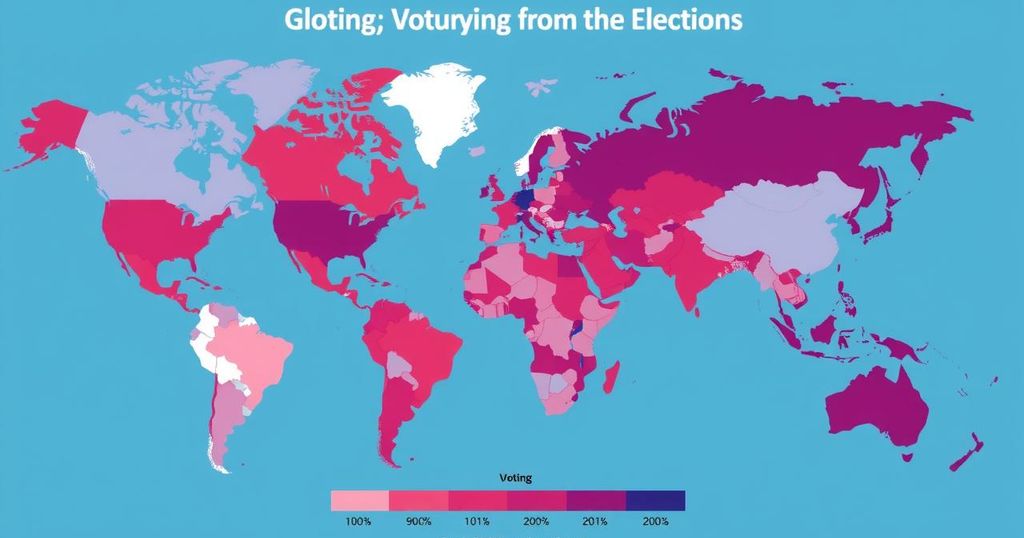A Global Reflection on the 2024 Elections: Democracy in Flux
In 2024, global democracy saw significant voter engagement, with more than 60 countries participating in elections. Results indicated that economic concerns remained pivotal, with many voters prioritizing personal interests over collective issues, leading to substantial defeats for incumbent leaders like Joe Biden and Narendra Modi. Notably, Vladimir Putin’s overwhelming electoral success in Russia showcased the risks of manipulated democratic processes amidst growing populism around the world.
The year 2024 marked a notable milestone in global democracy, as over 60 countries, representing nearly half of the world’s population, participated in elections. This unprecedented event reflected both the growth of democratic processes and the complexities of contemporary governance. However, the results revealed a troubling trend; voters prioritized immediate personal interests over collective concerns, driven by deep-seated fears and economic challenges. In many industrialized nations, pressing issues such as inflation and food security overshadowed discussions on long-term global challenges such as climate change.
In the United Kingdom, the Labour Party secured a decisive victory, largely due to economic disenchantment with the Conservative Party. Similarly, in the United States, President Joe Biden faced backlash despite achieving lower inflation, as rising living costs still impacted voters negatively, prompting them to support Donald Trump. This phenomenon was echoed in numerous countries, where traditional voting patterns emerged in response to economic hardships. For instance, in Germany, Chancellor Olaf Scholz’s coalition was ousted amidst growing dissatisfaction with the economy, suggesting a global discontent with incumbent administrations.
Despite setbacks, there were notable outcomes of significance. Donald Trump’s election victory in the United States could have far-reaching implications, and Emmanuel Macron’s decision to call for a parliamentary election after a poor showing for his party in the EU elections indicates the precarious nature of leadership amid public dissatisfaction. Notably, leaders such as Narendra Modi in India and Nelson Mandela’s party in South Africa also suffered losses, signaling a trend of declining support for established parties.
Conversely, the case of Vladimir Putin in Russia serves as a stark reminder of the misuse of democratic principles. His overwhelming electoral success, amidst allegations of oppression and media control, illustrates a perverse departure from true democratic representation. In stark contrast, Ukraine continues to hope for stability and legitimate leadership amid ongoing conflict incited by Russian aggression.
As the democratic landscape evolves, the interactions between global powers will significantly influence future elections and policies across continents. The results of 2024 have reflected evolving public sentiment and the intricate dynamics of international relations. The forthcoming year may serve as a litmus test for the sustainability of democratic governance, as countries emerge from decades of oppressive regimes, such as Syria, seeking to embrace democratic processes and elect their leaders.
The 2024 elections marked a significant moment in the history of democracy, with an unprecedented participation rate as a large portion of the global population engaged in the electoral process. This event was viewed as a critical opportunity to gauge the health of democratic systems worldwide and the values that voters prioritize. The context of economic hardship, climate crises, and leadership challenges shaped the decisions made by voters across developed and developing nations alike. The emergence of populism and nationalist sentiments also played a crucial role in influencing the outcomes, reflecting a shift in public sentiment and expectations from political leaders.
In summary, the democratic experience of 2024 highlighted both the strength and challenges facing modern governance. Voters increasingly prioritized immediate economic concerns over collective interests, leading to significant shifts in political landscapes globally. While some incumbents faced substantial electoral losses, others, reflecting authoritarian tendencies, exemplified a distortion of democratic norms. The results of these elections will undoubtedly impact future political dynamics and the collective trajectory of global democracy, emphasizing the importance of vigilance and engagement in democratic practices.
Original Source: www.cnn.com




Post Comment